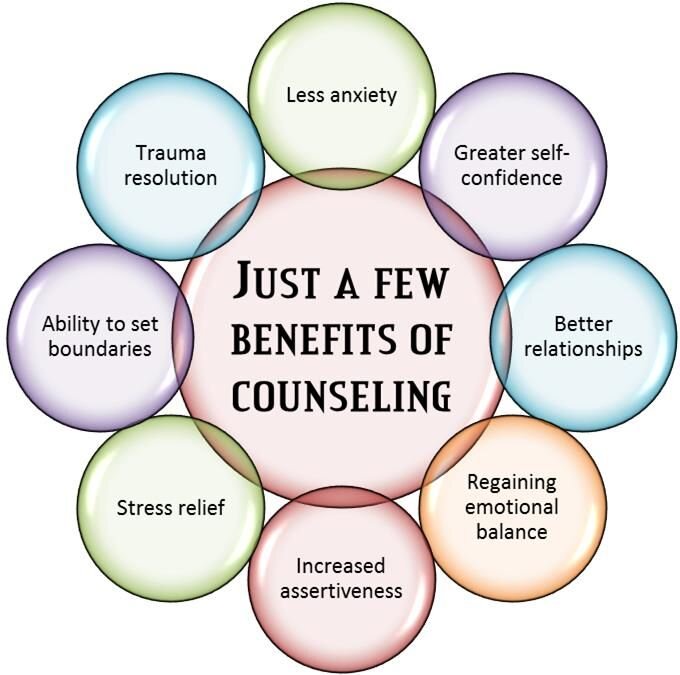The Relevance of Mental Wellness: a Deep Dive Into Counseling, Therapy, and Their Advantages
Psychological health and wellness substantially forms specific wellness, influencing behaviors, thoughts, and emotions. Therapy and therapy offer as vital opportunities for healing and individual growth. They use organized support, assisting people browse life's challenges. Many continue to be uninformed of the details types of therapy readily available and their distinct advantages. Comprehending these aspects is important for any individual thinking about professional psychological wellness support. What complies with may illuminate courses to strength and fulfillment that lots of overlook.
Understanding Mental Wellness and Its Effect
Psychological health is frequently overlooked, it plays a necessary function in overall health and daily performance - Couples Therapy. It incorporates emotional, mental, and social factors that influence how people think, feel, and behave. An individual's mental health straight impacts their capacity to take care of anxiety, connect to others, and choose. Poor mental health can lead to numerous concerns, consisting of anxiety, depression, and trouble in maintaining relationships, all of which can impede specialist and individual growth.Furthermore, mental wellness has far-reaching ramifications for physical health and wellness. Persistent anxiety and untreated psychological problems can add to numerous physical conditions, such as cardiovascular disease and compromised immune reactions. Conversely, positive mental health and wellness fosters strength, allowing people to handle life's challenges efficiently. Comprehending psychological health and wellness's significance is crucial for fostering helpful atmospheres that promote emotional well-being, thus boosting the top quality of life for individuals and areas alike
The Various Types of Counseling and Therapy
In the domain name of mental wellness, different counseling and treatment types accommodate diverse demands. Individual therapy methods concentrate on personal issues with one-on-one sessions, while group therapy dynamics foster shared experiences and support amongst individuals. Comprehending these methods is essential for selecting the proper treatment for different difficulties.
Individual Counseling Approaches
Countless individual therapy strategies exist, each created to address specific mental health and wellness issues and satisfy differing client requirements. Cognitive Behavior Modification (CBT) concentrates on identifying and transforming unfavorable thought patterns, while Psychodynamic Treatment explores subconscious procedures and past experiences. Humanistic Therapy highlights personal development and self-actualization, fostering a supportive environment. Social Treatment (IPT) targets connection issues and communication patterns to improve emotional well-being. In addition, Approval and Commitment Treatment (ACT) encourages customers to approve their ideas and sensations while dedicating to personal worths. Each technique supplies distinct methods and viewpoints, enabling practitioners to tailor their approaches to the person, thereby boosting the therapeutic experience and advertising mental wellness recovery.
Group Treatment Characteristics
Team treatment dynamics include numerous therapeutic approaches that take advantage of the power of social relationships and common experiences. This form of treatment commonly consists of varied teams, cultivating a safe setting for participants to express sensations and thoughts. Key types of team therapy include support system, which give psychological assistance; process-oriented groups, focusing on interpersonal interactions; and psychoeducational groups, focused on giving knowledge concerning psychological health and wellness problems. The characteristics within these groups can enhance self-awareness, as participants commonly show on their habits in relationship to others. Furthermore, group therapy cultivates a sense of belonging, lowering feelings of seclusion. With shared narratives and collective problem-solving, individuals can develop dealing strategies and gain insights, ultimately contributing to specific development and healing.
The Function of Counseling in Mental Health And Wellness
Therapy plays a vital function in mental wellness by supplying numerous methods tailored to individual demands. These methods give professional support that can cause considerable enhancements in emotional well-being. Understanding the various sorts of counseling can assist individuals make notified decisions concerning their mental healthcare.

Sorts Of Counseling Methods
While different counseling strategies exist, each deals unique approaches and insights into psychological wellness therapy - Mental Health Resources. Among the most prominent are cognitive-behavioral therapy (CBT), which concentrates on changing adverse idea patterns; psychodynamic treatment, which discovers unconscious procedures and childhood experiences; and humanistic approaches, emphasizing personal growth and self-actualization. In addition, solution-focused quick treatment focuses on finding solutions in the here and now as opposed to delving into issues. Team therapy fosters community and shared experiences, while family treatment addresses relational dynamics within domestic structures. Each technique deals with various needs, straightening with individual choices, issues, and healing goals. Recognizing these techniques assists clients make educated choices concerning their mental health and wellness trip and advertises reliable therapy customized to their one-of-a-kind conditions
Advantages of Expert Advice
Various people take advantage of specialist advice in handling their psychological health challenges. Counseling provides a safe area for customers to explore their ideas and feelings without judgment. This restorative atmosphere fosters self-awareness, allowing individuals to identify patterns in their habits and create much healthier coping methods. Expert support likewise supplies accessibility to evidence-based strategies that can minimize symptoms of anxiousness, anxiety, and other psychological health and wellness problems. Moreover, counselors can aid in setting practical objectives and provide assistance in accomplishing them, improving overall health. The collaborative partnership between counselor and customer is crucial, as it advertises liability and urges personal growth. Inevitably, specialist support plays an essential duty in guiding mental health and wellness trips, resulting in boosted psychological strength and life contentment.
Advantages of Therapy: Recovery and Growth

Exactly how to Select the Right Specialist or Therapist
Just how can one browse the often overwhelming process of choosing the appropriate specialist or therapist? Recognizing individual requirements is vital; individuals must consider their certain issues, whether anxiety, depression, or relationship challenges. It is advantageous to study different therapeutic methods, such as cognitive-behavioral treatment or psychodynamic treatment, to find a suitable match.Next, possible clients need to look for referrals from trusted resources or make use of online directory sites. It is important to assess specialists' credentials, including their education, licensing, and look at here areas of expertise. Setting up first assessments can aid assess compatibility, allowing people to analyze communication designs and personal comfort.Finally, logistical aspects, such as place, schedule, and charges, must also be considered. By attentively evaluating these aspects, one can make an informed choice, eventually fostering a therapeutic relationship that sustains psychological health and individual growth.
Conquering Stigma: Embracing Mental Wellness Support
While social attitudes towards mental health have developed, preconception still offers a substantial barrier for many seeking support. This stigma commonly shows up as false impressions surrounding mental disorder, leading individuals to really feel embarassment or anxiety concerning their struggles. Lots of people think twice to go after therapy or therapy as a result of bother with being judged or identified. Conquering this preconception is fundamental for cultivating a helpful atmosphere where people can openly discuss their psychological health needs.Communities and companies play a crucial role in this transformation by advertising recognition and education regarding mental health and wellness problems. Initiatives that highlight personal stories can humanize these experiences, urging others to look for aid without anxiety. As approval grows, individuals might really feel a lot more encouraged to accept mental health and wellness support, recognizing it as a necessary element of general health. By dismantling stigma, society can cultivate a culture of understanding, empathy, and proactive psychological healthcare.
Techniques for Keeping Mental Well-Being Beyond Therapy
Although treatment supplies important assistance, keeping mental health outside of sessions is equally crucial. Individuals can implement numerous methods to maintain their mental health and wellness. Routine physical task plays a vital function, as exercise promotes the release of endorphins, which boost mood. Furthermore, a balanced diet plan rich in nutrients can greatly affect psychological stability and power levels.Practicing mindfulness and meditation aids people manage tension and establish greater self-awareness. Developing a regular rest routine is likewise fundamental, as high quality rest is important for cognitive function and psychological regulation.Engaging in social activities fosters link and reduces sensations of isolation. Going after hobbies or rate of interests can give an innovative electrical outlet and boost self-worth. Establishing realistic goals and practicing self-compassion allows individuals to cultivate resilience. By incorporating these approaches into life, individuals can efficiently support their psychological well-being past treatment sessions.
Regularly Asked Questions

How Can I Tell if I Need Treatment?

Determining the demand for therapy frequently entails acknowledging relentless sensations of sadness, anxiousness, or frustrating stress and anxiety. If daily working comes to be tough or coping mechanisms fall short, seeking specialist assistance might be a helpful advance.
What Should I Anticipate in My Initial Therapy Session?
In the very first treatment session, people can anticipate an introduction, discussion of their factors for seeking aid, and an introduction of the specialist's strategy, developing a structure for future conversations and developing convenience in the restorative area.
Are Online Therapy Procedure as Effective as In-Person Ones?
Study shows that online treatment sessions can be as efficient as home in-person ones. Factors such as the specialist's credentials, client engagement, and the healing relationship significantly influence outcomes, regardless of the tool used.
Can Treatment Aid With Connection Problems?
Therapy can assist people in attending to connection concerns by supplying devices for interaction, understanding feelings, and solving disputes. Cognitive Behavioural Therapy. It promotes healthier characteristics and urges individual growth, ultimately cultivating more powerful, a lot more meeting links in between partners
The Length Of Time Does Therapy Normally Last?
Treatment duration differs substantially based on specific requirements and goals. Generally, sessions may last from a couple of weeks to a number of months, with some individuals involving in recurring therapy to deal with long-term concerns and personal growth. Cognitive Behavioral Treatment (CBT) concentrates on determining and changing negative thought patterns, while Psychodynamic Therapy explores past experiences and subconscious procedures. Trick kinds of group treatment consist of support teams, which offer emotional support; process-oriented teams, focusing on interpersonal communications; and psychoeducational teams, intended at presenting expertise Extra resources regarding mental health and wellness problems. Among the most prominent are cognitive-behavioral therapy (CBT), which concentrates on changing adverse idea patterns; psychodynamic therapy, which discovers unconscious processes and childhood experiences; and humanistic approaches, emphasizing individual growth and self-actualization. Group treatment cultivates community and shared experiences, while household treatment addresses relational characteristics within familial frameworks. It is useful to research study various therapeutic methods, such as cognitive-behavioral therapy or psychodynamic therapy, to find an ideal match.Next, potential customers ought to look for references from trusted resources or utilize on the internet directories.